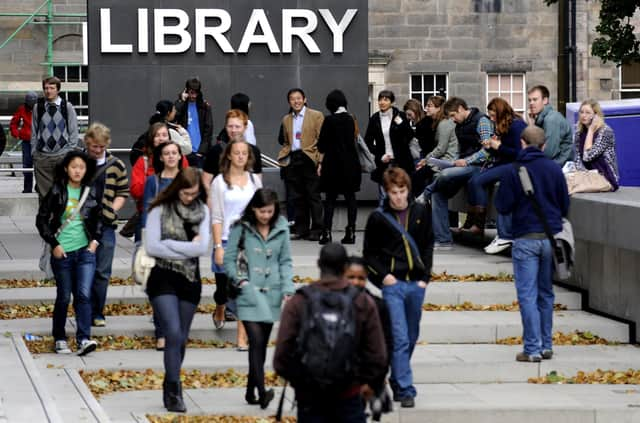Funding structure leading to 'artificial cap’ for Scottish students at universities in Scotland, according to think tank


In a new briefing paper on released on Monday, Reform Scotland calls for Scottish graduates who earn more than the Scottish average salary to contribute towards the cost of their higher education to create more funding to cover more places for Scots at universities.
Reform Scotland claims the policy would end the cap on Scottish domiciled students who are increasingly being refused entry.
Advertisement
Hide AdAdvertisement
Hide AdThe Scottish Government sets the amount of funding it will provide to Scottish universities each year in order to cover free tuition for domicile students in Scotland.
There is no cap on the number of fee-paying students from the rest of the UK or from overseas.
The briefing paper, Scrap The Cap, argues this funding capped for Scottish students has led to an 84% increase in the number of Scottish-domiciled applicants being refused entry to universities in Scotland since 2006 as more people apply for university.
The percentage of Scottish domicile students at Scottish universities varies across the country.
Only 30 per cent of undergraduate full-time first degree students at Edinburgh and St Andrews are Scottish domicile students.
At Glasgow Caledonian, the University of the Highlands and Islands and SRUC, this number stands at 90 per cent.
At present in Scotland, only wider society pays through the tax system for graduates who are originally from Scotland, while the graduate does not contribute in any way that reflects the personal financial benefit from having a degree.
Reform Scotland proposes a system requiring repayment of tuition fees by those who can afford to do so. Anyone with little financial benefit as a result of attending university will repay “little or nothing”.
Advertisement
Hide AdAdvertisement
Hide AdLindsay Paterson, professor of education policy in the School of Social and Political Science at the University of Edinburgh, said scrapping the cap through the process of students contributing via a deferred fee would “free up money to provide bursaries for entrants to university from low-income families".
Professor Paterson, who is also a member of Reform Scotland’s Commission on School Reform, said: “We need to scrap this unfair cap.
“This change is not only inevitable, it is also right.”
Alison Payne, Reform Scotland’s research director and co-author of the briefing said: “The funding arrangement may seem like it benefits Scots as there are no direct fees to pay to attend university, but it has also created an artificial cap on the number of Scottish students that can study in Scotland.
“Our young people’s ambition is being stifled by how we fund higher education.”
Reform Scotland has also recommended the Scottish Government look at introducing schemes to cut or scrap repayments for graduates who remain in Scotland in order to work in certain sectors for set periods of time.
A Scottish Government spokesperson said:“The Scottish Government remains committed to free higher education for Scotland domiciled students and access to university being based on the ability to learn, not the ability to pay.
“Our continued commitment to free tuition ensures that eligible Scottish domiciled students studying in Scotland do not incur up to £27,750 of additional student loan debt and produces the lowest student debt levels in the UK.”
Comments
Want to join the conversation? Please or to comment on this article.
